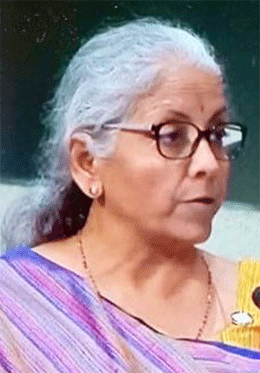Washington: Union Minister for Finance & Corporate Affairs Nirmala Sitharaman said India has projected growth rate of 7 Percent for the Indian Economy.
While participating in Joint World Bank-International Monetary Fund (WB-IMF) Development Committee (DC) meeting during the Annual Meetings 2022 in Washington DC, she said however, we remain concerned about the global economic outlook and geopolitical environment.
Smt. Sitharaman stated that the Food and Energy Crisis paper rightly identifies energy efficiency as the “first fuel of choice”. Similarly, reducing crop loss and food waste should also be the “first intervention of choice” to ensure food security.
The Finance Minister urged the World Bank to avoid a unidimensional view of subsidies and to differentiate between distortive subsidies and targeted support to the vulnerable households.
Giving India’s example as an illustration, Smt. Sitharaman said that by providing free LPG connections under the Pradhan Mantri Ujjwala Yojna over the last six vears. India has ensured that access to Clean cooking methods has achieved near saturation for women in India. This has made a definitive contribution in improving India’s performance on SDGS 3, 5 and 7.
While the quest for energy and food security necessitates non exclusion of fossil fuels from our energy mix, the Finance Minister noted that India has set up its first pure hydrogen producing plant as well as its first 2G bioethanol refinery this year.
Going forward, Smt. Sitharman said that there are 3 clear opportunities for the World Bank Group:
Promoting behavior change to increase energy efficiency and to reduce food losses. Programs like the Lifestyle for the Environment (LiFE) launched by the Prime Minister of India on the World Environment Day in June 2022, in which David Malpass, president, World Bank Group, delivered a wonderful keynote address, can mainstream responsible consumption behavior.
On financing climate and development goals, the Finance Minister said that the WBG is uniquely placed to bring together all stakeholders for developing an investment strategy for climate and development finance. Yet, the world must never lose focus on the internationally agreed basic principle of common but differentiated responsibilities. This necessitates avoidance of a one-size fit-all approach.
Smt. Sitharaman stated that mitigation of risks is essential for crowding in private capital. While welcoming the launching of SCALE, the Finance Minister encouraged the World Bank to increase the share of grants from the current 5 % level and to work below the country level to support projects with huge climate impact beyond the national borders.
While urging the World Bank to take the lead and also help build consensus across MDBS, the Finance Minister pushed for the recommendations of the Independent Review of the MDB Capital Adequacy Frameworks commissioned by the G20 hold the key for sustained financing.


